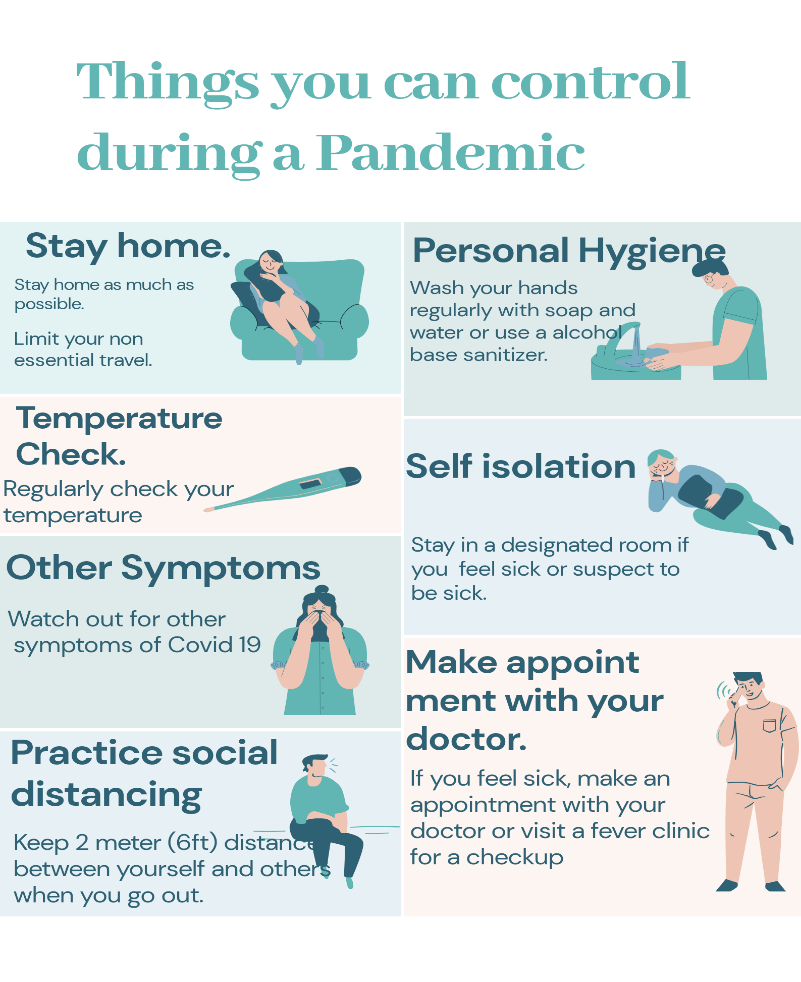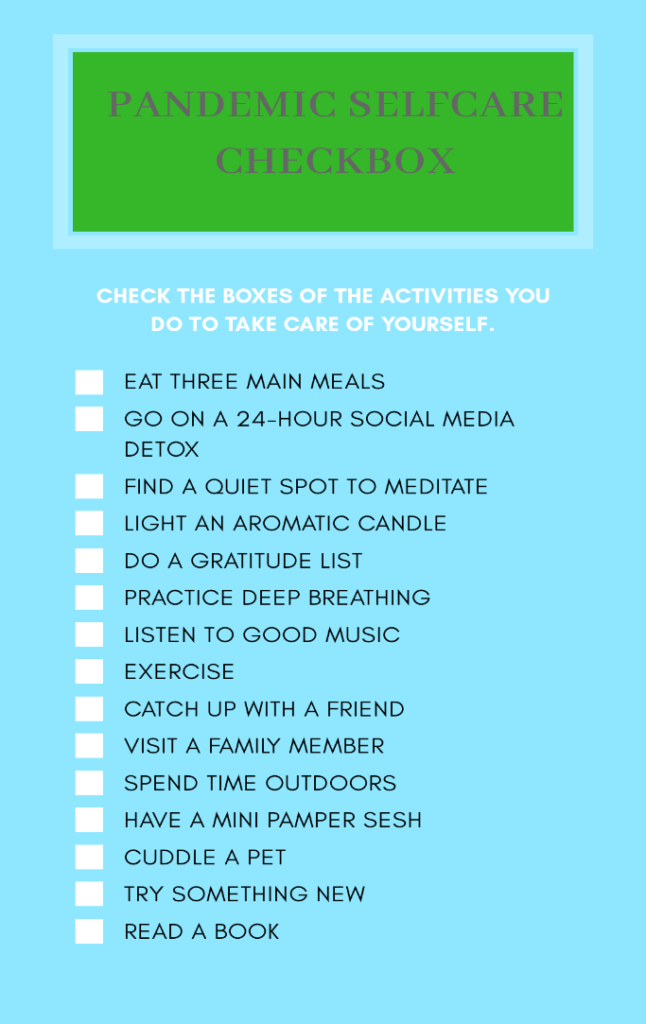Fear is a reaction to a definite and very real threat, whereas, anxiety is a reaction to ambiguous or bizarre threats and it is absolutely essential to gain insight on how to deal with anxiousness. Anxiety is conspicuous when we believe that an unsafe or disastrous event may take place and we are automatically anticipating it. Every person at some point in time in their life experiences anxiety at their own different degree and intensity.
A pandemic is a specific and rare state of affairs. The outbreak of novel Coronavirus (COVID-19) which was “characterized as a pandemic” by the director of World Health, (Ghebreyesus, 2020).
“It has deeply disturbed how we live and work, and many of us are feeling comprehensibly stressed, confused, and frightened. This is not just a public health crisis, it is a crisis that will touch every sector, So every sector and every individual must be involved in the fights.”
(Ghebreyesus, 2020)
Hence, it is normal to feel anxious during a pandemic. Fear and anxiety related to a disease can be overwhelming, which could result in strong emotions in adults and children. However, for some people it is hard to control their fears which is more perpetual and happens to affect their daily lives.
Anxiety in the course of an infectious disease outbreak includes:
- Stress and concern regarding their own health and the health of the family
- Change in sleep pattern and the eating style
- Struggling to concentrate on important matters
- Deterioration of prolonged health problems
- Deterioration of mental health problems
- Increased consumption of cigarettes, alcohol, or any other type of drug
The heightened anxiety during the hectic, unprecedented time is inevitable but there are ways to improve your attitude in dealing with it that can greatly reduce your overall sense of helplessness. Instead of feeling the waves of lockdown anxiety, we could learn how to overcome anxiousness during a pandemic.
Ways to Deal With Anxiety During Pandemics
Stay informed about the news and advises from relevant authorities
It is important to know what’s happening in your area and to take the necessary precautions when required. Stay away from the fabricated information going around that makes you more anxious. Use reliable sources such as the World Health Organization, health authorities, reliable local newspaper. Avoid constant monitoring of news and social media feeds which can aggravate your anxious feeling rather than easing it. If you are feeling overwhelmed with news feeds, try cutting down your media consumption to a specific timeframe. Verify your information before passing it to others and spreading unnecessary fright.
Concentrate on things you can control
The uncertainty surrounding this pandemic includes; how everyone acts, what’s happening in the economy, when will the lockdown finish, how long we have to work from home an all the various scenarios that might occur. We start looking for incomprehensible answers for all the scenarios we might come up without actually facing them, hence, feeling flabbergasted, anxious, and drained out.
Try shifting your attention to things you can control when you feel being caught up in the distress of thinking about what might happen during this pandemic and ways to overcome anxiousness. One cannot control the harshness of the pandemic but can take steps to reduce the spread and fear of risk surrounding it. There are plenty of things people can do to control the spread, especially to the ones who are at high risk. Things that people can do to control the spread includes:
- Keeping your hands clean at all times. Wash it with soap and water for 20 seconds or using alcohol-based hand sanitizer especially after visiting the washroom, before eating and touching your face, after coughing or sneezing.
- Avoid touching your face, especially eyes, nose, and mouth.
- Limit your non-essential travel and shopping, except going out to buy medicine or food. Stay home when you are not even sick.
- Practice social distancing – avoid close contact with other people and avoid crowds and gatherings.
- Plan your self-isolation/self-quarantine – It’s okay to be concerned about what’s happening at the workplace, school, and with other relatives and friends. Plan for what you can and being proactive can relieve some level of fear and anxiety.
- Follow your health authorities’ recommendations and advice.

Stay connected even during self-isolation or self-quarantine
While it is very important to maintain social distance yourself from other people to condense the spread of the virus, social distancing can be its own source of stress – the worries about families and friends, particularly those who are at higher risk with job security and the upcoming financial problems. Few or no social contacts incubates anxiety and over time it builds up making it hard to contain. Also, cutting down on social interactions causes loneliness which can lead to depression. Hence it’s important to stay connected and reach out to support when needed.

Try doing video chats with your loved ones. Face-to-face chats will uplift your mental health and help in reducing stress and fear of being alone.
Stay engaged with social media in a meaningful way to feel connected in a greater way to our communities, friends, family, and acquaintances is the best means to beat social anxiety.
While chatting, don’t let the conversation be only on the pandemic, move out of that discussion, and enjoy each other’s company with your laughs and stories, and talk on other things of life.
It’s the right time to explore the full potential of digital technologies that will assist us to stay connected.
Take care of yourself
Good self-care helps in keeping your immune system healthy. It is important to eat a balanced diet, get enough sleep, engaging in leisure activities that will help keep you physically and psychologically healthy, and stress-free. Here are ways in which you can practice good self-care during this pandemic:
- Go easy on yourself if you facing more than the usual depression or anxiety. You are not alone.
- If you are stuck at home for isolation, make a routine for yourself and habit to follow it such as mealtime, work schedules, sleep time, family time, and leisure time. This will help you feel a sense of normalcy.
- Get yourself plenty of sunshine and fresh air – you will feel good.
- Stay active by engaging in regular exercise – cycling, walking or hiking, yoga, or practice online exercise videos. This will, in turn, help manage your mood to release and relieve your stress.
- Avoid using alcohol or other addictive and harmful substances/drugs to help in dealing with anxiety and depression.

Help each other during a crisis
During this time of crisis, everyone is worried about their fears and concern. A lot of people have lost their jobs or are working on reduced hours during this pandemic and they are worried about their family, financial status and when will this pandemic end. It’s important to remind everyone that we are not alone in this. Helping others will make a greater difference not only to your communities but the world at large and this will also elevate your own mental health and well-being. Panic buying by people has also made others who are not able to afford in fear of price increase or shortage of food supplies – similar to the epic toilet paper fight.
- Try reaching out to others in need. Especially the elders or less fortunate ones.
- Donate food/cash to help older people, low-income earners, or those who lost their jobs.
- Being a positive influence on someone’s life in this anxious time will make you feel better about your situation.
- Barter for a better living – helping others with what they need in return for what they can do for you will make you feel content and less anxious.
Conclusion
All in all, this pandemic is worst the world has ever faced and everyone is going through their own set of fear and anxiety and each person’s mental health is deeply affected. It is important to follow certain measures on how to deal with anxiousness during a pandemic that will help throughout this time of uncertainty.
